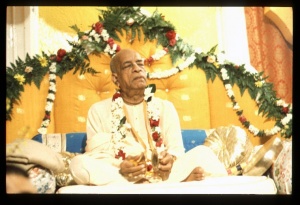CC Madhya 6.136: Difference between revisions
m (1 revision(s)) |
No edit summary |
||
| Line 1: | Line 1: | ||
{{ | [[Category:Sri Caitanya-caritamrta - Madhya-lila Chapter 06|C136]] | ||
<div style="float:left">'''[[Sri Caitanya-caritamrta|Śrī Caitanya-caritāmṛta]] - [[CC Madhya|Madhya-līlā]] - [[CC Madhya 6|Chapter 6: The Liberation of Sārvabhauma Bhaṭṭācārya]]'''</div> | |||
<div style="float:right">[[File:Go-previous.png|link=CC Madhya 6.135|Madhya-līlā 6.135]] '''[[CC Madhya 6.135|Madhya-līlā 6.135]] - [[CC Madhya 6.137|Madhya-līlā 6.137]]''' [[File:Go-next.png|link=CC Madhya 6.137|Madhya-līlā 6.137]]</div> | |||
{{CompareVersions|CC|Madhya 6.136|CC 1975|CC 1996}} | |||
{{RandomImage}} | |||
==== TEXT 136 ==== | ==== TEXT 136 ==== | ||
<div | <div class="verse"> | ||
jīvera asthi-viṣṭhā dui—śaṅkha-gomaya | :jīvera asthi-viṣṭhā dui—śaṅkha-gomaya | ||
śruti-vākye sei dui mahā-pavitra haya | :śruti-vākye sei dui mahā-pavitra haya | ||
</div> | </div> | ||
| Line 12: | Line 16: | ||
==== SYNONYMS ==== | ==== SYNONYMS ==== | ||
<div | <div class="synonyms"> | ||
''jīvera''—of the living entity; ''asthi''—the bone; ''viṣṭhā''—stool; ''dui''—two; ''śaṅkha''—conchshell; ''go-maya''—cow dung; ''śruti-vākye''—in the words of the Vedic version; ''sei''—that; ''dui''—two; ''mahā''—greatly; ''pavitra''—pure; ''haya''—are. | |||
</div> | </div> | ||
| Line 19: | Line 23: | ||
==== TRANSLATION ==== | ==== TRANSLATION ==== | ||
<div | <div class="translation"> | ||
Caitanya Mahāprabhu continued, “Conchshells and cow dung are nothing but the bones and the stool of some living entities, but according to the Vedic version they are both considered very pure. | Caitanya Mahāprabhu continued, “Conchshells and cow dung are nothing but the bones and the stool of some living entities, but according to the Vedic version they are both considered very pure. | ||
</div> | </div> | ||
| Line 26: | Line 30: | ||
==== PURPORT ==== | ==== PURPORT ==== | ||
<div | <div class="purport"> | ||
According to Vedic principles, bones and dung are generally considered very impure. If one touches a bone or stool, he must take a bath immediately. That is the Vedic injunction. Yet the Vedas also enjoin that a conchshell, although the bone of an animal, and cow dung, although the stool of an animal, are very much sanctified. Even though such statements appear contradictory, on the basis of the Vedic version we still accept the fact that conchshells and cow dung are pure and sanctified. | According to Vedic principles, bones and dung are generally considered very impure. If one touches a bone or stool, he must take a bath immediately. That is the Vedic injunction. Yet the ''Vedas'' also enjoin that a conchshell, although the bone of an animal, and cow dung, although the stool of an animal, are very much sanctified. Even though such statements appear contradictory, on the basis of the Vedic version we still accept the fact that conchshells and cow dung are pure and sanctified. | ||
</div> | </div> | ||
__NOTOC__ | |||
<div style="float:right; clear:both;">[[File:Go-previous.png|link=CC Madhya 6.135|Madhya-līlā 6.135]] '''[[CC Madhya 6.135|Madhya-līlā 6.135]] - [[CC Madhya 6.137|Madhya-līlā 6.137]]''' [[File:Go-next.png|link=CC Madhya 6.137|Madhya-līlā 6.137]]</div> | |||
__NOTOC__ | |||
__NOEDITSECTION__ | |||
Revision as of 09:52, 29 July 2021

A.C. Bhaktivedanta Swami Prabhupada
TEXT 136
- jīvera asthi-viṣṭhā dui—śaṅkha-gomaya
- śruti-vākye sei dui mahā-pavitra haya
SYNONYMS
jīvera—of the living entity; asthi—the bone; viṣṭhā—stool; dui—two; śaṅkha—conchshell; go-maya—cow dung; śruti-vākye—in the words of the Vedic version; sei—that; dui—two; mahā—greatly; pavitra—pure; haya—are.
TRANSLATION
Caitanya Mahāprabhu continued, “Conchshells and cow dung are nothing but the bones and the stool of some living entities, but according to the Vedic version they are both considered very pure.
PURPORT
According to Vedic principles, bones and dung are generally considered very impure. If one touches a bone or stool, he must take a bath immediately. That is the Vedic injunction. Yet the Vedas also enjoin that a conchshell, although the bone of an animal, and cow dung, although the stool of an animal, are very much sanctified. Even though such statements appear contradictory, on the basis of the Vedic version we still accept the fact that conchshells and cow dung are pure and sanctified.